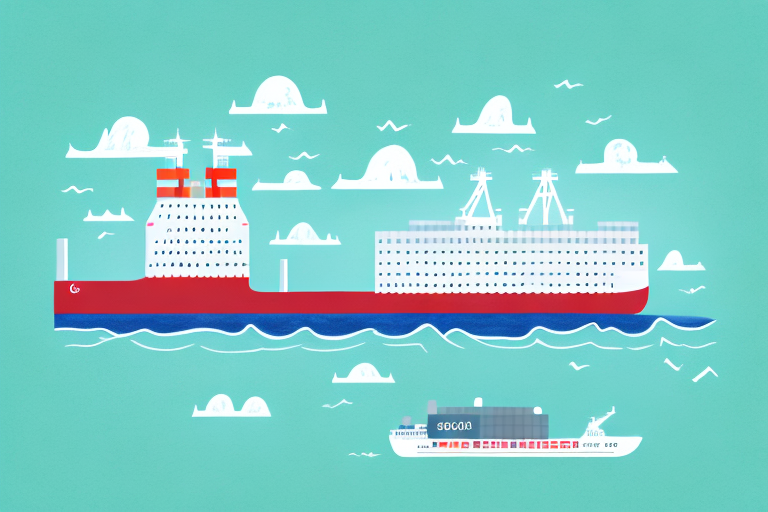Exploring the Impact of the Shipping Economy on Global Trade
Global trade has been an integral part of human society for centuries, and the shipping economy has played a crucial role in facilitating this activity. The ability to transport goods across oceans, seas, and rivers has allowed nations to engage in international trade and benefit from the exchange of goods and services. This article provides an in-depth analysis of the impact of the shipping economy on global trade, covering its history, importance, technological advancements, advantages and disadvantages, environmental impact, key players, future trends, and the link with international politics. We also discuss how the COVID-19 pandemic has affected the shipping industry and its impact on global trade.
The History of Shipping and Its Impact on Trade
The history of shipping can be traced back to the ancient Greeks, who used triremes to transport goods and people across the Mediterranean. As seafaring nations in Europe and Asia rose in prominence, the shipping industry expanded significantly. The development of steamship technology in the 19th century transformed global trade by enabling the rapid and efficient transportation of goods over long distances. This advancement allowed for the expansion of trade networks and the exchange of a wide range of goods, including spices, textiles, and metals.
The advent of containerization in the mid-20th century further revolutionized the shipping industry. Containerization facilitated the movement of goods and cargo in large quantities, reducing shipping costs and improving efficiency. According to the United Nations Conference on Trade and Development (UNCTAD), containerization has been a key driver in the growth of global trade.
Today, shipping continues to be a vital component of global trade, with over 90% of the world's trade being transported by sea. Despite facing challenges such as environmental concerns and piracy, the shipping industry remains essential in connecting businesses and consumers worldwide. Innovations like advanced navigation systems and security measures have helped mitigate some of these challenges, ensuring the continued importance of shipping in the global economy.
The Shipping Economy: Importance and Structure in Global Trade
The shipping economy encompasses all activities related to the transportation of goods and cargo across the world's oceans and waterways. This includes freight forwarding, port management, shipbuilding, and logistics. The shipping industry plays a vital role in global trade by connecting manufacturers, traders, and consumers from around the world. The ability to transport goods across long distances has allowed for the expansion of trade networks and the exchange of a vast array of commodities.
Economic Significance
The shipping industry is a major contributor to the global economy, generating employment and income for millions of people worldwide. According to the International Maritime Organization (IMO), the maritime sector contributes approximately $3 trillion to global GDP and supports over 10% of global trade.
Drivers of Growth
One of the key factors driving the growth of the shipping industry is the increasing demand for goods from emerging markets. Countries like China and India have seen significant economic development, leading to an expanding middle class and a growing appetite for consumer goods and other products. This surge in demand has increased the need for shipping services as manufacturers and traders seek to transport their goods to these new markets.
Challenges Facing the Industry
Despite its importance, the shipping industry faces several challenges, including rising fuel costs, environmental concerns, and geopolitical risks. Additionally, there is a growing focus on sustainability and reducing the industry's carbon footprint, driving the development of new technologies and practices such as the use of alternative fuels and more efficient shipping routes.
The Role of Technology in Transforming the Shipping Industry
Technological advancements have significantly transformed the shipping industry, enhancing the efficiency and reliability of transporting goods across waterways. Digital technologies such as GPS tracking, automated systems, and electronic communication have enabled greater efficiency in cargo tracking, logistics, and ship management.
Autonomous Ships
One of the most significant technological advancements in the shipping industry is the development of autonomous ships. These vessels are equipped with sensors, cameras, and advanced navigation technologies that allow them to operate without human intervention. Autonomous ships have the potential to reduce accidents, improve efficiency, and lower operational costs. However, concerns about safety, security, and regulatory standards remain.
Blockchain Technology
Blockchain technology is another innovation transforming the shipping industry. As a decentralized digital ledger, blockchain enables secure and transparent transactions. In shipping, blockchain can be used to track the movement of goods from origin to destination, enhancing transparency and reducing the risk of fraud. Studies have shown that blockchain can significantly improve supply chain efficiency and reduce costs, though widespread adoption is still in the early stages.
Advantages and Disadvantages of the Shipping Economy in Global Trade
Advantages
- Cost-Efficiency: Shipping large quantities of goods at once leads to economies of scale, lowering costs for businesses.
- Global Reach: Shipping provides access to markets that may be difficult to reach by other means of transportation, including remote or landlocked areas.
- Reliability: With established routes and schedules, shipping offers reliable transportation solutions essential for global supply chains.
Disadvantages
- Environmental Impact: Shipping contributes to carbon emissions and other environmental issues, necessitating sustainable practices.
- Security Risks: The potential for piracy and other security threats poses risks to shipping operations.
- Regulatory Challenges: The industry is heavily regulated, and compliance with various international laws can be complex and costly.
- Vulnerability to Disruptions: Global supply chains are susceptible to disruptions from geopolitical issues, natural disasters, and other unforeseen events.
Evaluating the Environmental Impact of the Shipping Industry
The shipping industry has a significant environmental footprint, contributing to air and water pollution, climate change, and the degradation of marine ecosystems. According to the International Maritime Organization (IMO), shipping accounts for approximately 2.5% of global CO2 emissions.
Regulations and Sustainability Initiatives
Several international regulations aim to reduce the environmental impact of shipping. The IMO's 2020 sulfur cap mandates a reduction in sulfur emissions from ships, encouraging the use of cleaner fuels. Additionally, initiatives like the Sustainable Shipping Initiative promote sustainable shipping practices through the adoption of alternative fuels, energy efficiency measures, and waste reduction strategies.
Technological Innovations for Sustainability
Advancements in technology are crucial for mitigating the environmental impact of shipping. Innovations such as hybrid propulsion systems, wind-assisted propulsion, and the use of low-sulfur fuels are being implemented to reduce emissions. Moreover, digital solutions like route optimization and energy management systems help minimize fuel consumption and operational costs.
Key Players in the Shipping Industry and Their Impact on Global Trade
The shipping industry comprises various key players, including shipping companies, port operators, freight forwarders, and logistics providers. These entities play a vital role in the industry's operations and, by extension, influence global trade dynamics.
Shipping Companies
Major shipping companies, such as Maersk and MSC, dominate the global shipping market. These corporations control vast fleets and establish critical shipping routes, impacting global trade flows and logistics.
Port Operators
Port operators manage the infrastructure and operations necessary for the loading and unloading of ships. Efficient port management is essential for minimizing delays and ensuring the smooth flow of goods in international trade. Ports like Port of Singapore and Transnet are pivotal in facilitating global maritime logistics.
Freight Forwarders and Logistics Providers
Freight forwarders and logistics providers coordinate the movement of goods from manufacturers to consumers, handling tasks such as documentation, customs clearance, and transportation management. Companies like DHL and Kuehne + Nagel are influential in shaping the efficiency and reliability of global supply chains.
The Future of the Shipping Economy and Its Implications for Global Trade
The shipping industry is poised for significant transformation in the coming years, driven by emerging trends and technological advancements. Sustainability and decarbonization remain at the forefront, with increasing pressure to reduce the industry's environmental footprint.
Emerging Technologies
Digitalization and automation continue to reshape the shipping landscape. The adoption of artificial intelligence (AI), predictive analytics, and blockchain technology enhances operational efficiency, supply chain transparency, and decision-making processes. Furthermore, the development of autonomous vessels promises to revolutionize maritime transport by reducing human error and operational costs.
Sustainable Practices
The shift towards alternative fuels, such as liquefied natural gas (LNG) and hydrogen, is gaining momentum as the industry seeks to comply with stringent environmental regulations. Energy-efficient vessel designs and the implementation of green port initiatives are also contributing to a more sustainable shipping economy.
Geopolitical and Economic Factors
The increasing prominence of Asia, particularly China, in the shipping industry influences global trade patterns. Additionally, geopolitical tensions and trade policies, such as tariffs and protectionist measures, affect shipping routes and demand for services. The industry's ability to adapt to these factors will be crucial for maintaining growth and resilience in global trade.
The Link Between International Politics and Shipping Industry's Impact on Global Trade
International politics significantly influences the shipping industry's operations and, by extension, global trade. Trade policies, economic sanctions, and geopolitical conflicts shape the regulatory and operational environment in which shipping companies operate.
Trade Agreements and Organizations
International agreements like the World Trade Organization (WTO) and the United Nations Convention on the Law of the Sea (UNCLOS) establish the legal framework for maritime operations and trade. These agreements facilitate smooth and standardized shipping practices, promoting global commerce.
Geopolitical Tensions
Geopolitical tensions, such as those in the South China Sea or the Strait of Hormuz, can disrupt shipping routes, increasing transit times and costs. Furthermore, economic sanctions imposed by nations can restrict trade with certain countries, affecting shipping routes and the demand for services.
Protectionism and Economic Nationalism
The recent trend towards protectionism and economic nationalism presents challenges for the shipping industry. Policies that prioritize domestic industries over international trade can reduce shipping volumes and alter global trade dynamics, requiring shipping companies to adapt their strategies accordingly.
The Impact of COVID-19 on the Shipping Economy and Global Trade
The COVID-19 pandemic has had profound effects on the global shipping industry, disrupting trade flows and freight operations while impacting industry revenues. The pandemic led to a significant decline in demand for certain goods, particularly those reliant on global supply chains, such as electronics and automotive parts.
Supply Chain Disruptions
Lockdowns and restrictions caused delays in production and shipping, exposing the vulnerabilities of global supply chains. The shortage of shipping containers and delays at ports increased shipping costs and transit times, challenging businesses to adapt quickly.
Acceleration of Digitalization
In response to the pandemic, the shipping industry accelerated the adoption of digital tools and automation to minimize physical contact and ensure business continuity. Technologies such as digital documentation, virtual port operations, and automated logistics systems became essential in maintaining operations during the crisis.
Economic Impact and Recovery
The shipping industry experienced significant financial strain due to reduced demand and operational disruptions. However, as global economies began to recover, demand for shipping services rebounded, highlighting the industry's resilience. The pandemic underscored the importance of flexibility and adaptability in the shipping sector to navigate future crises.
Conclusion
The shipping economy has been instrumental in facilitating global trade, connecting producers and consumers worldwide, and expanding trade networks. Its impact on global trade is profound, shaping economic development and international relations. Looking ahead, the industry's future will be shaped by emerging trends, technological advancements, and political developments. The shipping industry must continue to prioritize sustainability and innovation to minimize its environmental impact and adapt to the evolving global trade landscape. By embracing these changes, the shipping sector will ensure its continued relevance and viability in supporting global commerce.






















